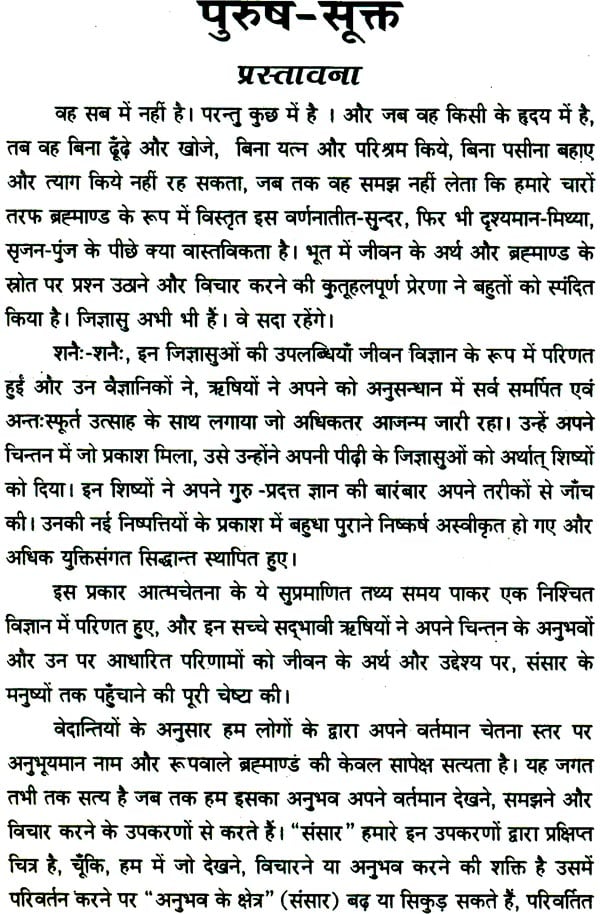Purusha-sukta means something in Buddhism, Pali, Hinduism, Sanskrit. If you want to know the exact meaning, history, etymology or English translation of this term then check out the descriptions on this page. Add your comment or reference to a book if you want to contribute to this summary article.
Introduction
- Purusha Suktam - In Sanskrit - Vedic Suktas The Purusha sukta describes in detail the spiritual unity of the universe. It showcases the nature of Purusha or the cosmic being as both immanent in the manifested world and yet transcendent to it. Purusha Sukta is hymn 10.90 of the Rigveda, dedicated to the Purusha, the “Cosmic Being”.
- Purusha Suktam - In Sanskrit - Vedic Suktas. The Purusha sukta describes in detail the spiritual unity of the universe. It showcases the nature of Purusha or the cosmic being as both immanent in the manifested world and yet transcendent to it. Purusha Sukta is hymn 10.90 of the Rigveda, dedicated to the Purusha, the “Cosmic Being”.
- Tune in to this ancient vedic chant popularly known as Purusha Suktam only on Rajshri Soul.The word ‘Purusha’ means God Almighty. This Suktam is in praise of.
- In Hinduism
- In Buddhism
- Languages
Purusha Suktam Sanskrit Text

Introduction:

Purusha Suktam Sanskrit Pdf
Purusha-sukta means something in Buddhism, Pali, Hinduism, Sanskrit. If you want to know the exact meaning, history, etymology or English translation of this term then check out the descriptions on this page. Add your comment or reference to a book if you want to contribute to this summary article.
The Sanskrit term Puruṣasūkta can be transliterated into English as Purusasukta or Purushasukta, using the IAST transliteration scheme (?).
In Hinduism
Purana and Itihasa (epic history)
Puruṣasūkta (पुरुषसूक्त) is the name of a mantra that is chanted during Dhārāpūjā, according to the Śivapurāṇa 2.1.14:—“ after performing the regular worship of Śiva, with great devotion in accordance with prescribed rules, the devotees shall pour water in a continuous stream (jaladhārā). This Dhārā worship [viz., Dhārāpūjā] is very efficacious in delirium due to fever (jvarapralāpa). At that time [...] Puruṣasūkta, [... etc.,] shall be repeated. The Dhārā worship [viz., Dhārāpūjā] is very excellent in regard to flourishing series of pleasures. [...]”.
Source: Cologne Digital Sanskrit Dictionaries: The Purana IndexPuruṣasūkta (पुरुषसूक्त).—Brahmā praised Hari by this;1 to be uttered while installing a new image.2
- 1) Bhāgavata-purāṇa X. 1. 20; Brahmāṇḍa-purāṇa IV. 43. 12.
- 2) Matsya-purāṇa 265. 26.
The Purana (पुराण, purāṇas) refers to Sanskrit literature preserving ancient India’s vast cultural history, including historical legends, religious ceremonies, various arts and sciences. The eighteen mahapuranas total over 400,000 shlokas (metrical couplets) and date to at least several centuries BCE.
Comments are closed.